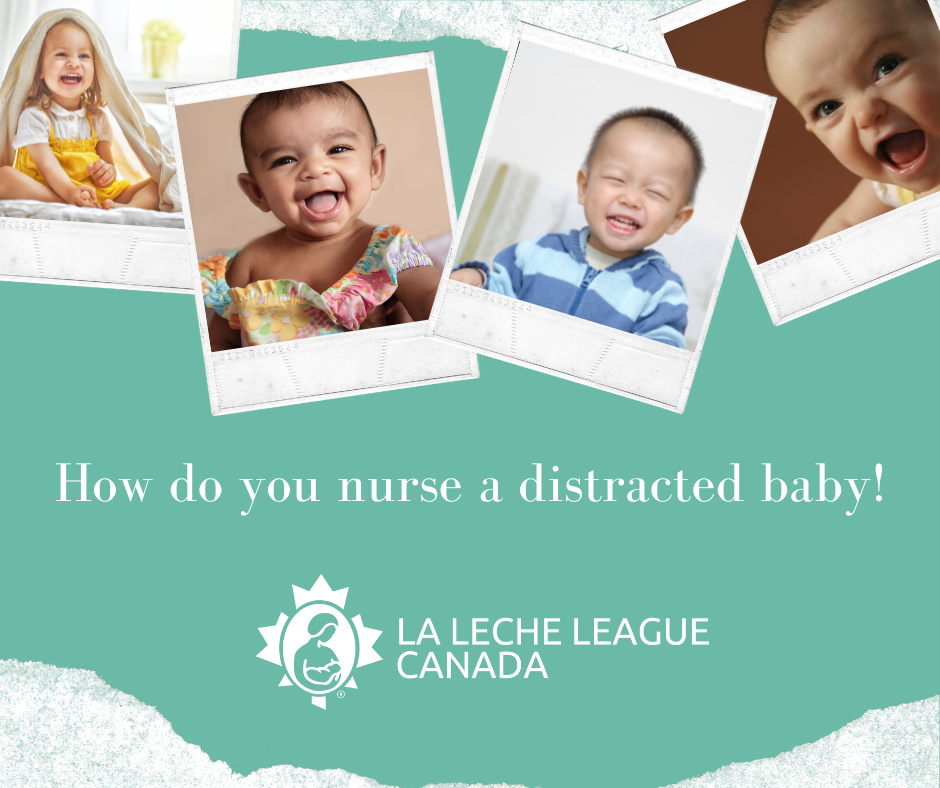
Somewhere in the six to twelve month range many mothers find their previously totally focused nursing baby has become a wiggler who can’t nurse in public, or if someone else is in the room, or if the TV is on, or if the cat walks by, or…!
What happened to your baby whose whole life revolved around breastfeeding? How do you keep breastfeeding through this stage? Having a little one who suddenly seems to not be interested in nursing can be confusing. You may wonder if your baby is weaning.
Weaning is a process not an event. It starts the day your baby has that first bite of solid food and continues until breastfeeding is completely finished. So, yes the distracted nursing stage is a part of the weaning process but it isn’t necessarily the final stage of the breastfeeding relationship.
How do you survive the distracted nursing stage and continue your breastfeeding relationship?
First, it helps to understand what is going on in your baby’s brain:
- Babies make several big developmental leaps during this time period: crawling, standing and even walking; turning babbling into words; eating new foods and other skills. Your baby will need to connect regularly with you, the place of safety, with a snuggle or by nursing. This allows your baby to regroup before forging ahead again. This need to reconnect with their primary adult is a biological need in all young children, breastfed or not. “Drive by”, short nursing sessions are common. As your baby is learning and exploring, these are important ways for your baby to reconnect throughout the day.
- Getting distracted by the things going on around is a sign that your baby’s brain is developing. At this stage your baby wants to look and see in order to learn about the sights and sounds around her. Later, when your baby’s brain develops further, she will be able to hear what is going on and make sense of it without having to let go of your breast and look around.
- Your baby is a more efficient nurser now than when he was a newborn. He can get all the milk he needs even during a short feeding. Your baby may prefer more short feedings during the day rather than the longer leisurely ones you had even a few weeks ago. You may find that longer nursing sessions occur before or after naps, bedtime or waking times.
Plan ahead:
- If you are going to be out and about, try to breastfeed before you leave the house. That way you won’t be worrying about your baby being hungry if she only nurses for a couple of minutes while you are away from home.
- If your baby is eating solid foods, bring some with you when you go out. Your baby may be more willing to have a snack of solids rather than breastfeed in a busy, distracting situation such as the mall, playgroup or community gathering.
- You may find that you need to reduce the distractions around you so your baby can have a few focussed feedings in the day. A good time for this is when your baby is going to sleep or waking up. This may mean keeping the TV off, not checking your phone, sitting in a darkened quiet room or lying on the bed. Decreasing the outside distractions is easier to do with your first baby. If you also have older children zooming around the house you may find nursing your baby in a sling or soft carrier can provide the “distraction free zone” your baby needs while you keep an eye on the older children. Babies at this age generally dislike being tucked under nursing covers and tend to pull them away.
- Some babies at this age will settle to breastfeed better if they have a familiar toy or blanket that is part of the nursing routine. This familiar object can help when traveling with your baby, but you’ll want to keep a close eye on it. Losing this familiar object or leaving it behind can cause great upset! Breastfeed children often don’t have a favourite toy or blanket because you and your breasts are their “attachment object”. Don’t stress about them not having a favourite toy or blanket if they aren't interested.
- Keep nursing at night. Night nursing is normal in babies at this age. Because your baby is so busy during the day, he may need to get a good portion of his milk intake during the night when there are fewer distractions available.
- Repeat frequently: “This is just a stage, this is just a stage”. It truly is “just a stage”. You can breastfeed your little one through this distractible stage and go on to breastfeed for as long as you and your baby want to.
- Talk to parents with babies older than yours. A La Leche League Canada meeting is a great place to find others who are in the same stage as you are or who have moved beyond this stage. Sharing ideas and stories can be a big help. Knowing that you are not alone can make it easier to wait it out.
On the other hand: If you would like to encourage partial weaning you may find it easier to make some changes at this stage. Many have accidently weaned during this stage. With a busy baby who isn’t asking to nurse during the day you can just follow their lead. Don’t offer the breast but don’t refuse. Within a few weeks this approach will likely get you to only breastfeeding when your baby is falling asleep and waking up.
For more support and information about distracted nursing, weaning or any other breastfeeding questions please contact a La Leche League Canada Leader.
Please consider supporting LLLC.
